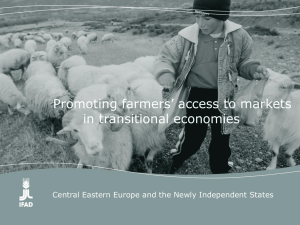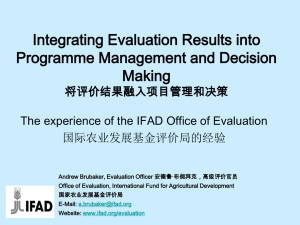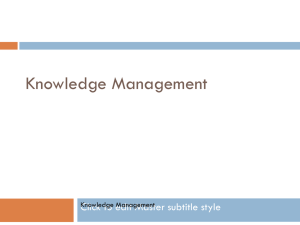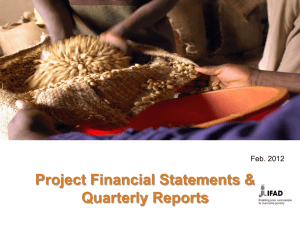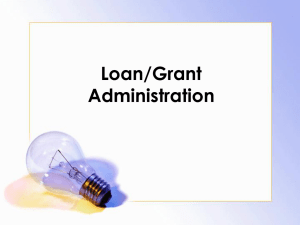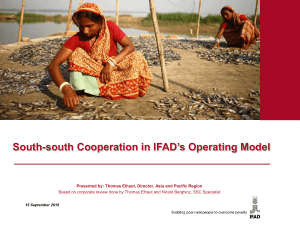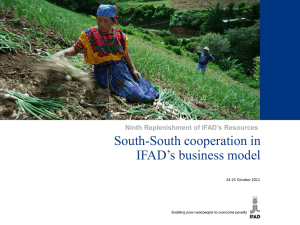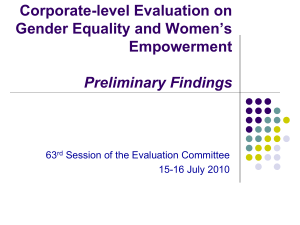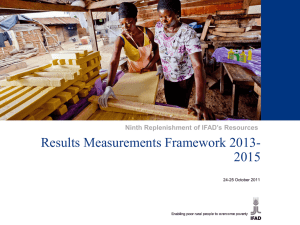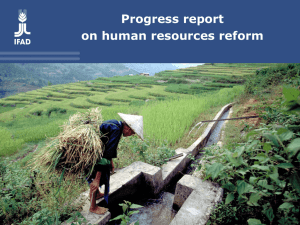IFAD Business Seminar
advertisement
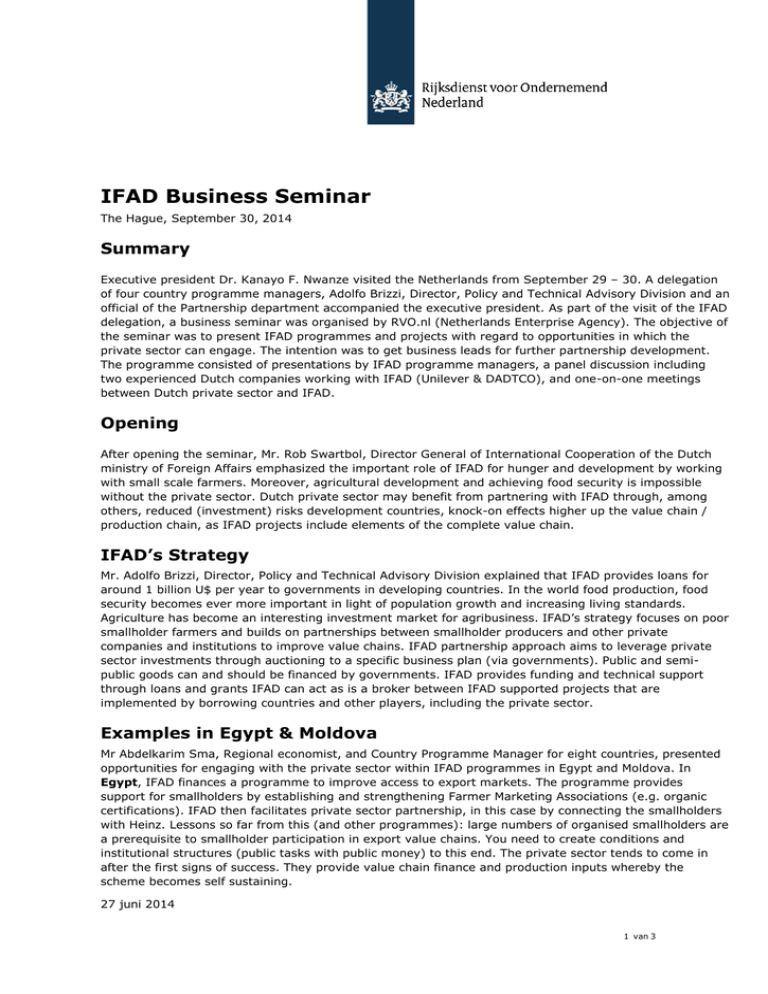
IFAD Business Seminar The Hague, September 30, 2014 Summary Executive president Dr. Kanayo F. Nwanze visited the Netherlands from September 29 – 30. A delegation of four country programme managers, Adolfo Brizzi, Director, Policy and Technical Advisory Division and an official of the Partnership department accompanied the executive president. As part of the visit of the IFAD delegation, a business seminar was organised by RVO.nl (Netherlands Enterprise Agency). The objective of the seminar was to present IFAD programmes and projects with regard to opportunities in which the private sector can engage. The intention was to get business leads for further partnership development. The programme consisted of presentations by IFAD programme managers, a panel discussion including two experienced Dutch companies working with IFAD (Unilever & DADTCO), and one-on-one meetings between Dutch private sector and IFAD. Opening After opening the seminar, Mr. Rob Swartbol, Director General of International Cooperation of the Dutch ministry of Foreign Affairs emphasized the important role of IFAD for hunger and development by working with small scale farmers. Moreover, agricultural development and achieving food security is impossible without the private sector. Dutch private sector may benefit from partnering with IFAD through, among others, reduced (investment) risks development countries, knock-on effects higher up the value chain / production chain, as IFAD projects include elements of the complete value chain. IFAD’s Strategy Mr. Adolfo Brizzi, Director, Policy and Technical Advisory Division explained that IFAD provides loans for around 1 billion U$ per year to governments in developing countries. In the world food production, food security becomes ever more important in light of population growth and increasing living standards. Agriculture has become an interesting investment market for agribusiness. IFAD’s strategy focuses on poor smallholder farmers and builds on partnerships between smallholder producers and other private companies and institutions to improve value chains. IFAD partnership approach aims to leverage private sector investments through auctioning to a specific business plan (via governments). Public and semipublic goods can and should be financed by governments. IFAD provides funding and technical support through loans and grants IFAD can act as is a broker between IFAD supported projects that are implemented by borrowing countries and other players, including the private sector. Examples in Egypt & Moldova Mr Abdelkarim Sma, Regional economist, and Country Programme Manager for eight countries, presented opportunities for engaging with the private sector within IFAD programmes in Egypt and Moldova. In Egypt, IFAD finances a programme to improve access to export markets. The programme provides support for smallholders by establishing and strengthening Farmer Marketing Associations (e.g. organic certifications). IFAD then facilitates private sector partnership, in this case by connecting the smallholders with Heinz. Lessons so far from this (and other programmes): large numbers of organised smallholders are a prerequisite to smallholder participation in export value chains. You need to create conditions and institutional structures (public tasks with public money) to this end. The private sector tends to come in after the first signs of success. They provide value chain finance and production inputs whereby the scheme becomes self sustaining. 27 juni 2014 1 van 3 In the Moldova programme, IFAD facilitates by setting up a fund with blended finance via the government (Agriculture Equity Fund), focused on providing financing to SMEsin the form of equity. The challenge is that providers of finance (for instance local banks) think short-term, whereas need is long-term debt finance. Examples in Lesotho & Swaziland Mr Thomas Rath, Country programme Manager for South Africa, Lesotho and Swaziland detailed IFAD programmes in Lesotho and Swaziland. In Lesotho the value chain of mohair is being strengthened, starting at the basis with farm management and organising herders. Herders’ organisations take the whole value chain up to Durban and Port Elizabeth, where the market channels are the international auctions for mohair. The entry point for the private sector is delivery of goods and services, engage as a processor or wholesaler. In Swaziland the honey value chain is strengthened. Honey is in high demand in South Africa. The IFAD programme involves local traders who enter into contracts with smallholders. Assistance is provided for farm management (irrigation), organising and training, as well as funding (rural financial services). Here, private sector involvement has already been achieved by wholesalers NAMBOARD and Eswatini Kitchen, but there are more opportunities along the honey value chain. Panel discussion The panel was completed with two country programme managers, Hubert Boirard the country programme manager for Bangladesh and Claus Reiner (Argentina, Paraguay, Uruguay) and from the Dutch private sector Jan-Kees Vis (Global Director Sustainable Sourcing Development of Unilever) and Suzanne Vlakveld (Value Chain Manager of DADTCO) joined the panel. Mr. Boirard and Mr. Reiner highlighted some of the features and opportunities of IFAD programmes in Liberia, Rwanda/Uganda and Mozambique. In Liberia a U$25 mn loan was provided for a coco and coffee programme to revive the sector; it was underlined that setting up a public-private partnership is often a long term process and a long-term investment to which both partners have to be willing to invest in. In Rwanda and Uganda, IFAD is funding programmes for the tea and palm oil industry, whereby smallholderschemes are linked to private actors. In Mozambique, IFAD works on cassava to produce beer, where a cooperation with DADTCO is in place. As for existing partnerships with the Dutch private sector Unilever signed an MoU with IFAD . In selected countries around the world, IFAD and Unilever procurement teams are connecting. An important element is the governance of the arrangement and the division of labour. Unilever offers markets through their supply chains and IFAD brings in the involvement of smallholder farmers. Another example is the DATCO-IFAD partnership. This partnership focuses on cassava processers in SubSahara Africa using a producing technique based on Dutch innovation and knowledge of the potato industry. Not only export is the aim, but also input substitution on local and national markets is targeted. The added value of working with IFAD is high in the cassava value chain, particularly when compared to for instance with the wheat chain. When companies like Heineken or SAB-Miller need to organise their value chain, they work with a limited number of producers; however if DADTCO wants to work with a value chain of cassava in a country it means engaging 4500 small farmers. IFAD provides an enabling environment by organising and training farmers for instance. DADTCO reported about its experience with IFAD, and highlighted that the country presence of IFAD is limited to a few people, since IFAD is working through national governments. During the panel discussion different issues were raised, among others: Target groups for financing agriculture were initially banks and financing institutions (MFI): MFI is short term (6 months), banks use guarantee funding (works a little bit better). Now also insurers 2 van 3 and agri-business are involved, for example by financing inputs in advance. Agri-business currently seems quite promising, but also the micro insurance is on the increase. How to engage with smallholders directly and find the knowledge in countries? Going through the government does not have to be too difficult if it is a good project. The closer to the top of the ‘pyramid’, the more diverse the farmers, companies, etcetera. The more difficult the matchmaking becomes. Trade missions can be a tool to overcome this. Impartial parties/NGO’s (such as SNV) can also assist by playing the role of broker thereby helping to solve issues such as the “devil in the detail”. Pilots are being carried out. Governments, such as the Netherlands, are increasingly underlining the important role of the private sector in development cooperation. What percentage of the IFAD loans are repaid and can be used for new projects? All loans IFAD provides to borrowing countries are being repaid. The rate of arrears is very low, currently around 1% because of solid arrears policies in place. If IFAD financial sheets would be rated, it would likely obtain a triple A rating. How does IFAD and others deal with corruption? DATCO does not have the feeling that corruption affected their projects much. It depends on the people you work with. Since IFAD closely works with governments, and co-finances and co-designes projects (such as in Liberia), the risk of corruption is lower. The financing agreements with IFAD are always ratified by parliament, and therefore by the State rather than the Government, and IFAD can suspend projects if there is a suspicion of corruption. IFAD business model provides for as much transparency as possible. Closing Finalising the morning programme, IFAD president Dr. Kanayo F. Nwanze and Liliane Ploumen, the Minister for Foreign Trade and Development Cooperation, gave an inspiring speech that shows the genuine interest of both IFAD’s highest management and the Dutch policy in engaging with the private sector to contribute to food security and economic development. Dr. Nwanze emphasized that the best way to achieve global food security is to transform smallholder agriculture into profitable rural businesses that generate surpluses, have access to agri-industry, supply local and national markets, and that offer a pathway out of poverty and hunger. To enable this, IFAD intends to strengthen its ability to leverage public-private-producer partnerships – the 4 P’s. Minister Ploumen mentioned her pride for Dutch companies taking the lead when it comes to investing in sustainable agricultural value chains in the developing world. In so doing they create momentum in the local private sector. And they also create opportunities for small scale producers and employment for rural men and women. The combined efforts of IFAD and private sector companies may well be the key to eliminate poverty and generate economic growth. Therefore, in partnership with IFAD she hopes to further develop strong linkages between the Dutch private sector and the needs of small scale farmers in developing countries. She emphasized that investing in women who are farmers and entrepreneurs is smart business. The seminar was closed by RVO.nl host of the day, Arthur van Leeuwen, who invited participants for the network lunch to further discuss business opportunities. In the afternoon 1-on-1 meetings were arranged between IFAD country programme managers and Dutch companies. 3 van 3
